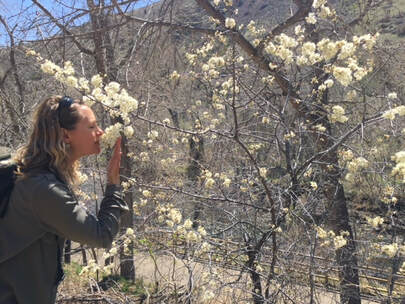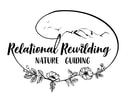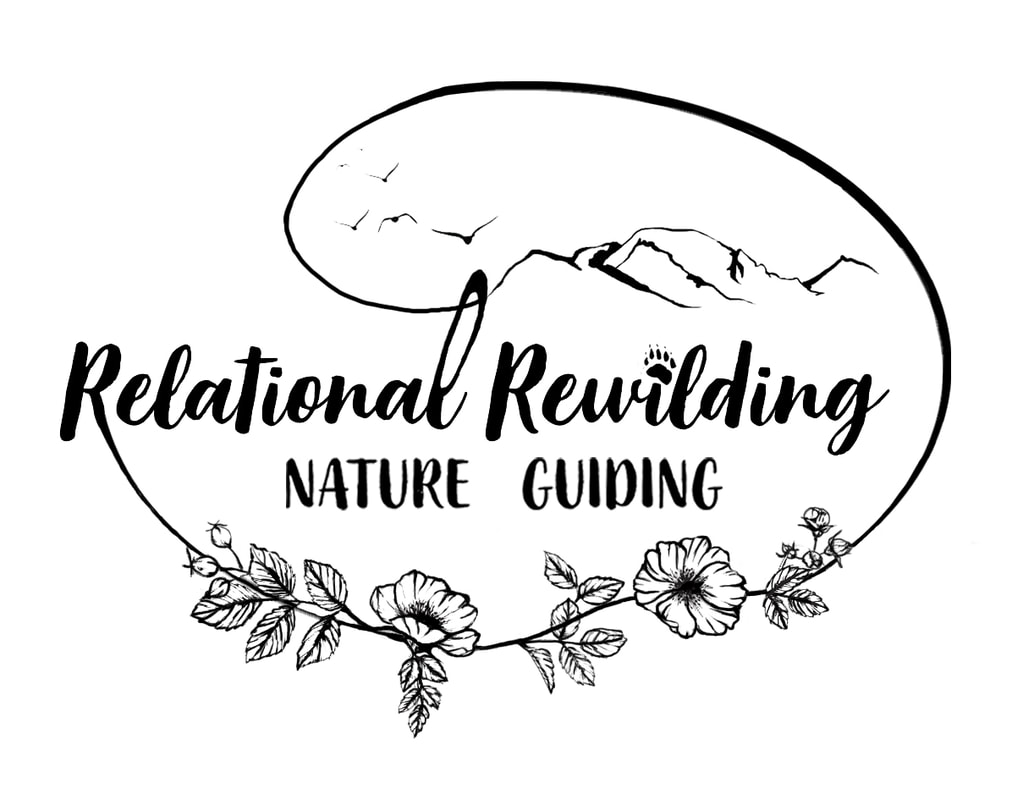'The tragedy in life is not what we suffer, but what we miss.'
-Thomas Carlyle

The above quote is one of my favorites. This earth and all our relations are too beautiful to miss.
Forest Bathing slows you down, if only for a short time, so that you do not miss. It serves to guide us back to our senses, back to our evolutionary design. We humans know a lot and we think a lot, thank goodness. However, thinking inhibits perception. And with blind spots in our relational and physical perception - we miss things. We miss people. We miss relationships. We miss opportunities. We miss beauty. And we miss a felt sense of belonging.
Our connection to nature is embedded within our DNA, yet we miss or forget this fact. 'Nature is not a place to visit, it is home', says poet Gary Snyder, and he is correct. Our brains, bodies, and relationships have their origins in nature, and it is there we find peace. Nature and the forests provide us with all the physical, psychological and chemical attributes needed to live healthy lives – but our challenge is to learn how to reconnect with the living forest.
Shinrin Yoku is Japanese for “forest bathing” or “taking in the forest atmosphere”. This popular Japanese therapy represents a form of nature-based healing. Shinrin-Yoku was developed in Japan during the 1980s and has become a building block of preventive health care and healing in Japanese medicine. Researchers primarily in Japan and South Korea have established an extensive body of scientific literature on the health benefits of spending time under the canopy of a living forest. Relational Rewilding Nature Guiding's 'rewilding' approach to Forest Bathing expands the conventional approach to Shinrin Yoku; Our approach emphasizes reciprocity and stewardship along with the healing abilities presented by the natural world, and may incorporate wild-tending, bird language or other experiments spontaneously designed to expand perceptions and relational meaning with nature and yourself. It is important to remember that it is not only nature that is good for us; with intention and care, we are good for nature.
Forest Bathing slows you down, if only for a short time, so that you do not miss. It serves to guide us back to our senses, back to our evolutionary design. We humans know a lot and we think a lot, thank goodness. However, thinking inhibits perception. And with blind spots in our relational and physical perception - we miss things. We miss people. We miss relationships. We miss opportunities. We miss beauty. And we miss a felt sense of belonging.
Our connection to nature is embedded within our DNA, yet we miss or forget this fact. 'Nature is not a place to visit, it is home', says poet Gary Snyder, and he is correct. Our brains, bodies, and relationships have their origins in nature, and it is there we find peace. Nature and the forests provide us with all the physical, psychological and chemical attributes needed to live healthy lives – but our challenge is to learn how to reconnect with the living forest.
Shinrin Yoku is Japanese for “forest bathing” or “taking in the forest atmosphere”. This popular Japanese therapy represents a form of nature-based healing. Shinrin-Yoku was developed in Japan during the 1980s and has become a building block of preventive health care and healing in Japanese medicine. Researchers primarily in Japan and South Korea have established an extensive body of scientific literature on the health benefits of spending time under the canopy of a living forest. Relational Rewilding Nature Guiding's 'rewilding' approach to Forest Bathing expands the conventional approach to Shinrin Yoku; Our approach emphasizes reciprocity and stewardship along with the healing abilities presented by the natural world, and may incorporate wild-tending, bird language or other experiments spontaneously designed to expand perceptions and relational meaning with nature and yourself. It is important to remember that it is not only nature that is good for us; with intention and care, we are good for nature.
An Added Note:
In the states 'forest bathing' has been given an alternate name: Forest Therapy. While there are many formal psychotherapists that have completed the 'Forest Therapy' training and choose to collaborate with nature in this way, many trained 'forest therapists' are not therapists, they are guides. The word 'therapy' is not a legally protected word but is commonly used interchangeably (by both professionals and the public) with 'psychotherapy' which is a legally protected word. Typically when people hear the word 'therapy' they assume 'psychotherapy' which technically refers to:
"Psychotherapy" means the treatment, diagnosis, testing, assessment, or counseling in a professional relationship to assist individuals or groups to alleviate mental disorders, understand unconscious or conscious motivation, resolve emotional, relationship, or attitudinal conflicts, or modify behaviors which interfere with effective emotional, social, or intellectual functioning. Psychotherapy follows a planned procedure of intervention which takes place on a regular basis, over a period of time, or in the cases of testing, assessment, and brief psychotherapy, it can be a single intervention. It is the intent of the general assembly that the definition of psychotherapy as used in this part 2 be interpreted in its narrowest sense to regulate only those persons who clearly fall within the definition set forth in this subsection (9). -Colorado Mental Health Practice Act
I fully support the theory and practice of Forest Bathing as well as the growing research behind it. My life has been dedicated to the studies of nature (all my naturalist schooling, training and work) and the studies of people (through graduate school in counseling and work as a psychotherapist) so that I may do my best at reciprocally connecting nature and people (which I call 'Rewilding'). Forest Bathing is an exciting movement, overlapping with Rewilding to a significant degree.
In other professional fields such as Physical Therapy and Massage Therapy, they go through a great deal of schooling and are licensed. In addition, these roles do not get conflated with other kinds of therapies as is potential of 'forest therapy' for psychotherapy. I share all of this just so the public is informed.
In the states 'forest bathing' has been given an alternate name: Forest Therapy. While there are many formal psychotherapists that have completed the 'Forest Therapy' training and choose to collaborate with nature in this way, many trained 'forest therapists' are not therapists, they are guides. The word 'therapy' is not a legally protected word but is commonly used interchangeably (by both professionals and the public) with 'psychotherapy' which is a legally protected word. Typically when people hear the word 'therapy' they assume 'psychotherapy' which technically refers to:
"Psychotherapy" means the treatment, diagnosis, testing, assessment, or counseling in a professional relationship to assist individuals or groups to alleviate mental disorders, understand unconscious or conscious motivation, resolve emotional, relationship, or attitudinal conflicts, or modify behaviors which interfere with effective emotional, social, or intellectual functioning. Psychotherapy follows a planned procedure of intervention which takes place on a regular basis, over a period of time, or in the cases of testing, assessment, and brief psychotherapy, it can be a single intervention. It is the intent of the general assembly that the definition of psychotherapy as used in this part 2 be interpreted in its narrowest sense to regulate only those persons who clearly fall within the definition set forth in this subsection (9). -Colorado Mental Health Practice Act
I fully support the theory and practice of Forest Bathing as well as the growing research behind it. My life has been dedicated to the studies of nature (all my naturalist schooling, training and work) and the studies of people (through graduate school in counseling and work as a psychotherapist) so that I may do my best at reciprocally connecting nature and people (which I call 'Rewilding'). Forest Bathing is an exciting movement, overlapping with Rewilding to a significant degree.
In other professional fields such as Physical Therapy and Massage Therapy, they go through a great deal of schooling and are licensed. In addition, these roles do not get conflated with other kinds of therapies as is potential of 'forest therapy' for psychotherapy. I share all of this just so the public is informed.
Visit our Public Programs page for class times, or call for a private Forest Bathing experience.
Who: Individuals, Public Classes, Couples, Families, Friends, Small Groups
Where: Locations listed in advertisement or private participants choose with facilitator the desired local location. Options may include county parks, city parks, private property, national forest.
When: Year-round guided programs, specific times decided with participant(s) or are located on 'Public Programs' page. Session length may vary between 2-4 hours.
What: Outings are either offered to the public in 'Scheduled Nature Programs', or arranged for private individuals or parties. Our time together may alternate between hiking, wandering, sitting, sensory practices, natural movement, writing, wildcrafting, and discussions. Plan to leave more grounded, relaxed, and aware than you came.
How: Wild Forest Bathing sessions are easy to moderate, depending on length and location. Bring layers, sunscreen, water, notebook if desired, snack if desired. Contact us to schedule your private Wild Forest Bathing.
Cost: Varies between $15-$40 per person, per session - depending on length.
Who: Individuals, Public Classes, Couples, Families, Friends, Small Groups
Where: Locations listed in advertisement or private participants choose with facilitator the desired local location. Options may include county parks, city parks, private property, national forest.
When: Year-round guided programs, specific times decided with participant(s) or are located on 'Public Programs' page. Session length may vary between 2-4 hours.
What: Outings are either offered to the public in 'Scheduled Nature Programs', or arranged for private individuals or parties. Our time together may alternate between hiking, wandering, sitting, sensory practices, natural movement, writing, wildcrafting, and discussions. Plan to leave more grounded, relaxed, and aware than you came.
How: Wild Forest Bathing sessions are easy to moderate, depending on length and location. Bring layers, sunscreen, water, notebook if desired, snack if desired. Contact us to schedule your private Wild Forest Bathing.
Cost: Varies between $15-$40 per person, per session - depending on length.

